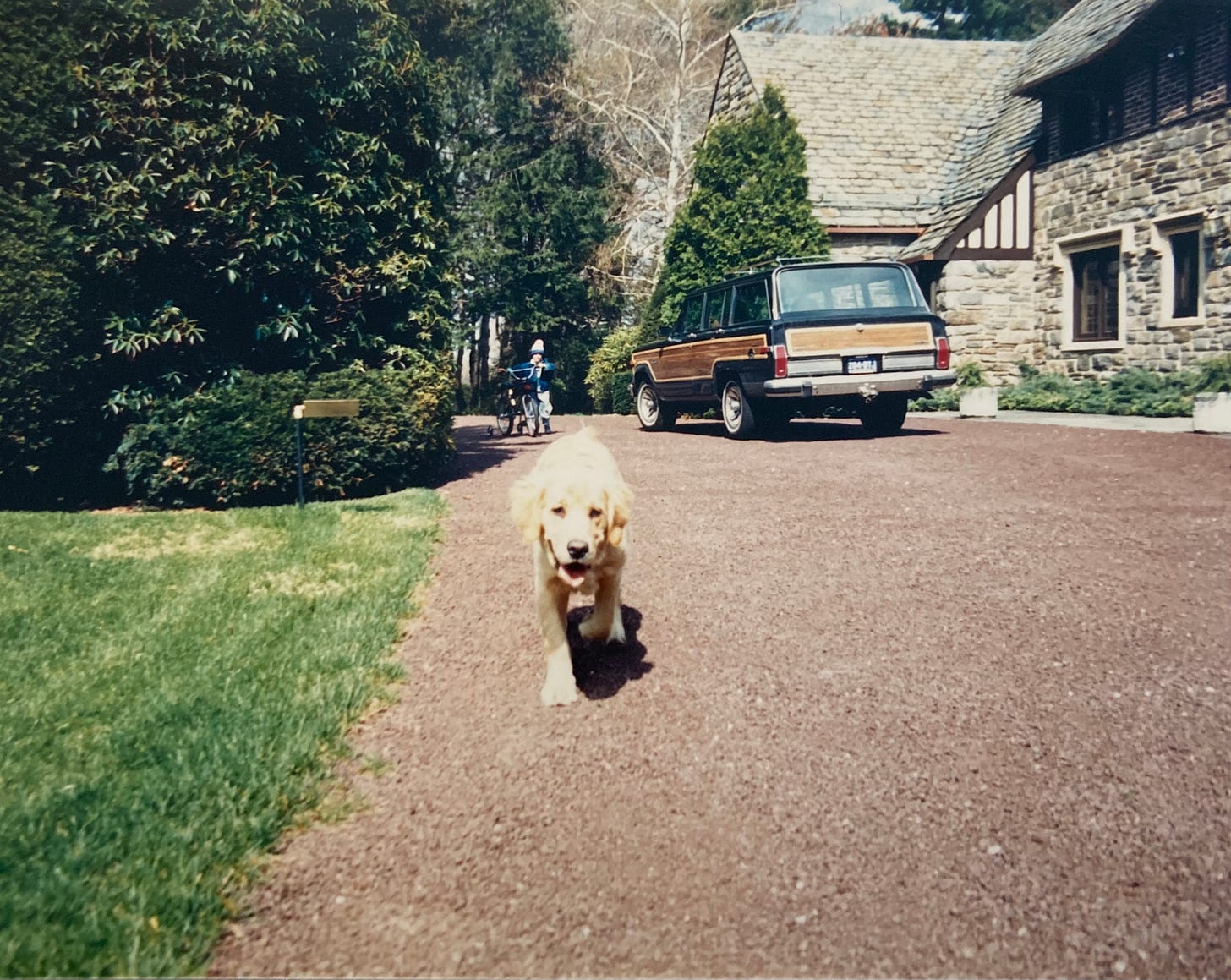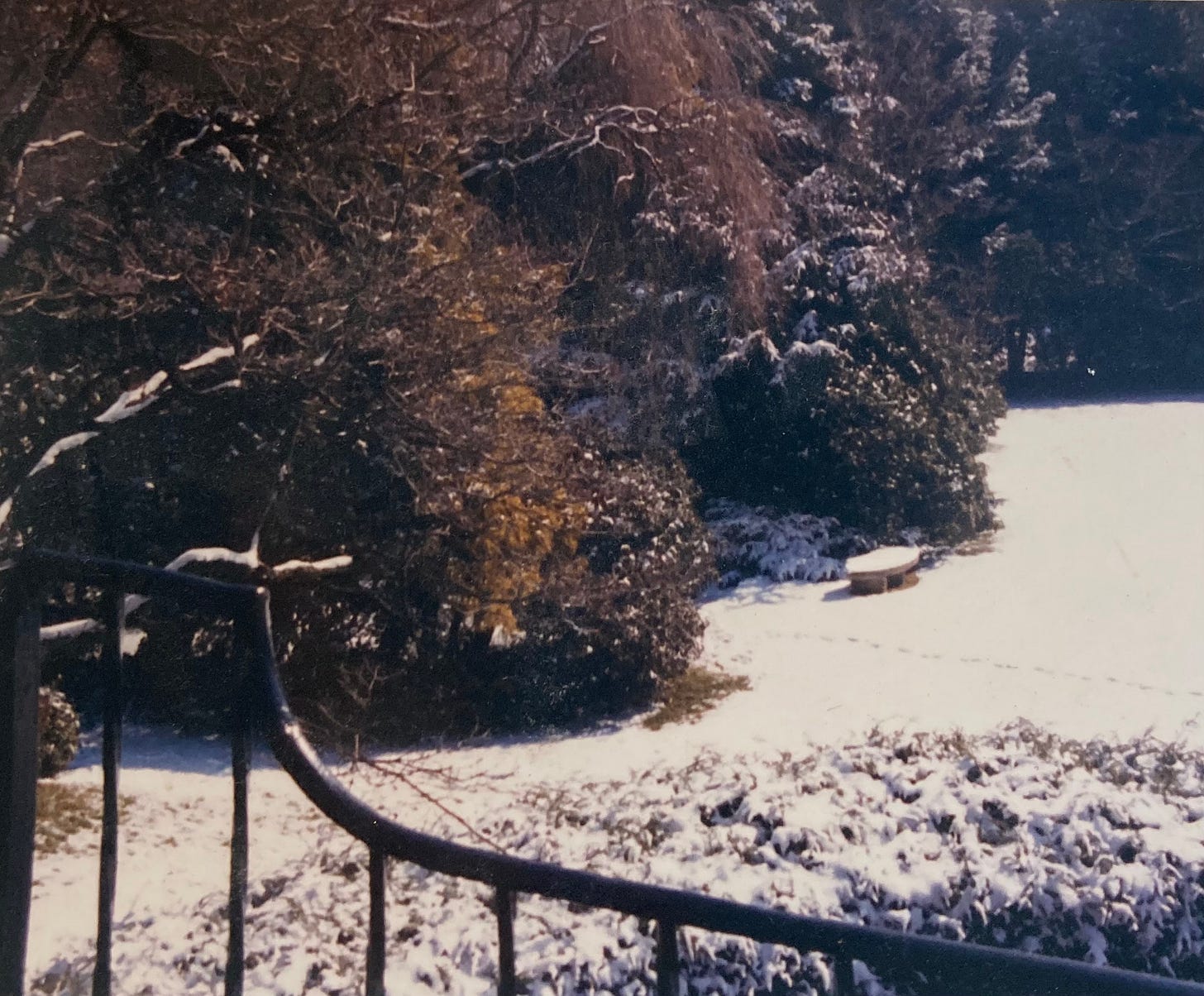Last night an ENT saved my life
On gaslighting in women's health and a belated diagnosis that could change big things for me
I’ve struggled with a battery of sleep issues since I was a young girl. If you’ve read my memoir THE YEAR OF THE HORSES, you’ll know that I equated the onset of my sleeping problems with the unraveling of my parents’ marriage and my younger brother’s heart issues, all of which intensified when I was eight. Well, I might have to put out an edited version of that memoir because yesterday I received a diagnosis from an Ear, Nose, and Throat doctor that might change my life.

My sleep issues first manifested in the house pictured above. I remember the first time I had insomnia—or rather “sleep maintenance insomnia” which is what I suffer from (an inability to stay asleep, whereas “sleep onset insomnia” is a difficulty going to sleep)—because my best friend Kristin was staying over, and the anecdote I’m about to share is something I’m ashamed of. I had two beds in my bedroom; both had frilly canopies and slim vertical columns that I remember being brass. Kristin was my ride or die back then, and she slept over all the time. But on that particular day, which was most likely a Saturday, I woke up at 4am. I knew this because I had a Mickey Mouse alarm clock that tick-tocked with its second hand and shuddered on the hour.
4am was not a good time to be awake, especially not on a sleepover. I tossed and turned and tried to go back to sleep to no avail. Around five a.m., the anxiety and disappointment of not being able to rest morphed into a feeling of otherness and loneliness that I experience to this day, the knowledge that I’m unable to do something that “normal” people do without discernible effort: sleep. I didn’t want to be alone, or weird, or different at that hour of the morning, so I did something shameful. I picked up one of the stuffed animals littering my mattress and tossed it at Kristin, causing her to stir. “Uggggh,” I moaned, as she shuffled about, suddenly awake. “You woke me! Well, if we’re both up, we might as well play!”1
That would be the first four a.m. wake-up of tens of thousands ahead.
I won’t go into the many things I’ve tried to cure my insomnia with here—you can read about the panoply of remedies and behavior modifications I’ve experimented with in my memoir if you’re interested—but I would like to talk about how the medical establishment has written off my sleeping disorders as par for female course. Accordingly to many doctors, my sleep problems are courtesy of my gender. My insomnia is because of hormones, because of periods, because I chose to be a mom, chose a difficult career path, chose red wine with dinner, and whatever the hell else. I’ve been told that my sleep issues are manifestations of my anxiety, my depression, my genetic makeup, even my birth sign. I have been told over and over that I should meditate and do yoga—that the problems that I wrestle with are only in my head.
Meanwhile, for decades, the problems that I wrestle with have been taking down my body. I’ve suffered hallucinations from my insomnia, I’ve been unable to drive safely. I’ve experienced weight loss and irritable bowel syndrome and I have suffered greatly from a chronic case of canker sores since I was eight years old. Since it’s true that my sleep problems started at age 8 when there were deep and troubling changes in my home life, I’ve given credence to the doctors who said that I’m neurotic and stressed out, that I overthink things, that I shouldn’t think so much. I have tried meditation. I have tried hot yoga and yin yoga and countless other forms of a practice I don’t like. I have tried warm baths at night; cold baths in the morning. I continued to see specialists but the only ones who acknowledged that I was suffering—truly suffering, at one point in my late thirties I had an emotional collapse—were 1) a podiatrist I saw in Paris when my bunions hurt so badly I thought my foot bones were going to push out of my skin and 2) my post-pandemic gynecologist, who must have had a health scare during the pandemic or something because he emerged from 2022 a newer, more feminist and highly attuned man who ordered a full hormonal test to see if I was low on estrogen, which could explain my inability to stay asleep. (I wasn’t low on estrogen, but I appreciated the blood tests.)
What can I say? I have done some things that are good for me to mitigate my insomnia—abstaining from alcohol, more exercise, no devices before bedtime, being careful of the kind of people I spend time with, acupuncture, breath work—and I have done things that are less good: Ambien, Doxepin, excessive drinking, manic social weekends where I just go and go and go until I’m ready to collapse, placing blame on others, needing to blame others, self-hatred, self-pity, denial, all of that.
Last October, I finally did a sleep study—the kind where they put nodes on your body and your head to monitor your brain waves. This was something I avoided because the concept of performing sleep for others caused me so much anxiety, it made my sleeping problems worse. The clinic I went to was new and understaffed. The principal reason I finally enrolled myself in the study is because over the last year, “snoring” has been added to the list of sleep issues that I have, and it’s gotten so bad that my husband decamped to another room. Because my mother has sleep apnea, I’m familiar with what it sounds like. We assumed that’s what I had. When I got my sleep results back, they were a jumble of lines and squiggles that I didn’t understand. When I called the lab for a decoding of these results, the receptionist told me “I didn’t have sleep apnea, that everything was normal,” and left me with my indiscernible test results and invisibility. I’d had high hopes for that sleep test—though I wasn’t eager to add a CPAP machine to the battery of stuff I already use at night, I was desperate for a change. I was desperate for some hope. After hearing that I didn’t have sleep apnea, I crawled back into the place of despondency and hopelessness I usually operate from regrading my insomnia, and did nothing differently for a few months until my husband bought me a box of “Breathe Right” nose strips for my snoring.
The first night I slept with a strip on, I woke up feeling like I’d been hit by a car (which I have been, so I don’t make that comparison lightly). I had a gruesome headache and flu-like aches and pains. I tested negative for Covid, which I’d assumed I had. Unclear why I felt ill, I took to Facebook to do what one does there: ask strangers to diagnose weird and private stuff. One woman, the poet Christina Stoddard, encouraged me to see an Ear, Nose, and Throat doctor— that an ENT had saved her life. And that is how I came to sit in front of Dr. O’Brien at the Ear, Nose + Throat Institute of Connecticut this week.
Dr. O’Brien’s first question was one I’d never been asked during my previous medical consults: “Did I have braces as a child?” I had braces, yes. They were put on when I was eight. I was the first kid in my class to get them. Sitting there in the clean office with a view of a parking lot, I registered that age eight was when my sleep problems began. But my insomnia was because I was “crazy” and “high strung” as I’d so often been told. Right?
After an examination that mostly consisted of me performing challenging exercises with my jaw and tongue, the doctor delivered his diagnosis: “You have an Anterior Nasal Valve Collapse,” he said, writing it down for me, “and Upper Airway Resistance Syndrome. Basically, when you got braces, your jaw wasn’t done growing. Your tongue kept growing, but your jaw’s growth was stunted and now you can’t breathe properly, especially at night where you’re basically choked by your own tongue.”
And then the doctor said something I’ve never heard before. “You have a problem. This is serious. You are not crazy.”
If you’re wondering if I cried, I did, after, in my car. I was so unaccustomed to being taken seriously by doctors that I went numb in the office. I don’t know what this diagnosis will mean for me in terms of solutions or even surgeries—I have to go back for a more in-depth exam and another sleep study—but what I do know is that to be told that I’m not “crazy” after all these decades of hearing that my problems are invented doesn’t feel amazing; at least, not yet. This diagnosis makes me sad. It makes me regret all the years behind me—decades—where I could have been more comfortable and happier and rested and healthy. It makes me want to take the nine year-old me who was taunted for turning beet red during PE and hug her. The bright red face I always get during physical effort isn’t because I’m out of shape or weak, it’s because I can’t breathe right. Same thing for the canker sores that I was told came from “stress” and “hormones.” They’re there because of my collapsed anterior nasal valve and my faulty breathing.
A lot of things happened to me when I was an eight year-old that changed my life, not necessarily for the better. Never in my wildest dreams would I have thought that getting braces would be the biggest, hardest thing. I’m someone who loves making connections where there are none, and I have never equated the corrective braces forced on me as an eight year-old with the insomnia that started at the same time.
I am full of sorrow for my younger self that felt like such a freak then, and my young adult self who wondered if she had a psychological disorder, and my adult self who has lived with the sensation of being at half-mast.
If you have sleep problems of any sort, get yourself to an Ear, Nose and Throat doctor. If you have physical and/or mental ailments that doctors don’t believe: it’s a small thing—I’m just one person—but I believe you.
Thanks for listening to me.
Courtney
I’m ashamed of this bad faith act of mine and I’ve apologized to Kristin both in person and in the pages of my memoir, since. (She’s forgiven me ;)







Incredible. The medical community as a whole needs to be retrained when it comes to women’s ailments. I was having heart issues and they kept chalking it up to anxiety. It wasn’t. It was a long-Covid symptom of Ehlers-Danlos Asynd try one which I self diagnosed and then was confirmed by genetic testing. I mean come on. We shouldn’t have to take things into our own hands or be made to feel like we’re crazy. I’m so so glad you got a solid diagnosis and wish you all the best in the recovery!
Whoa. My husband has very similar sleep struggles. I am sending him to an ENT, right away. I am sorry you lived with this for so long. And, you're right, we have to stop telling reasonable (or, in my case, possibly unreasonable) people it's all in their head, just because we don't know the answer. We know our bodies. How about, "I believe you, but I don't know what's causing it yet. We'll keep thinking and looking for a solution."